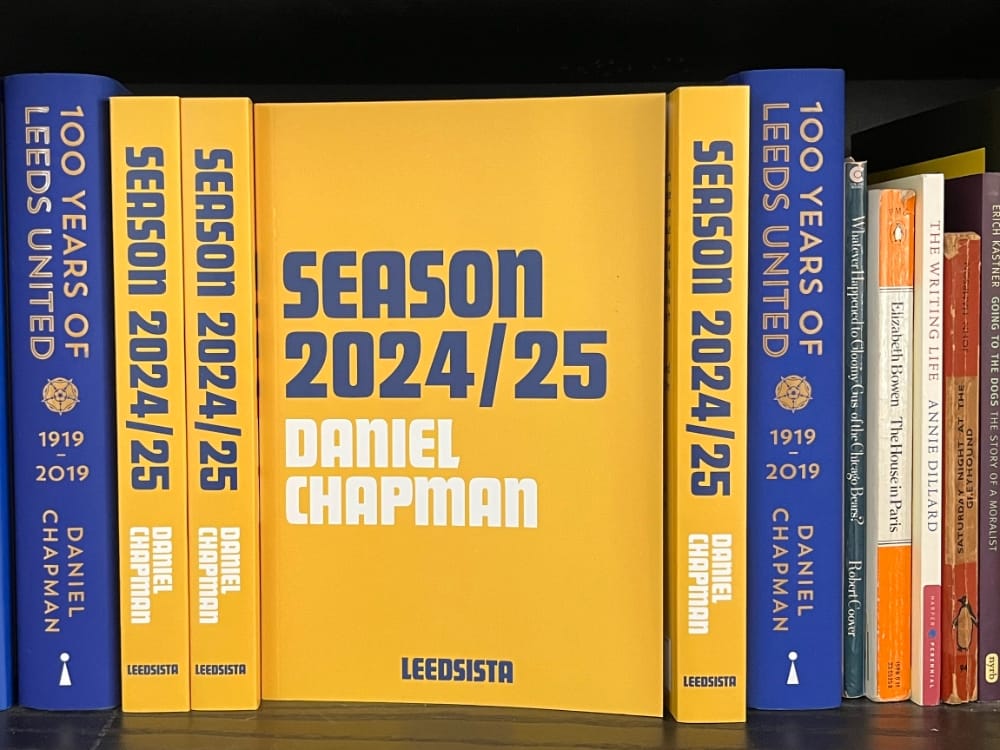Fotherby on Tour: Duncan Ferguson
Jim McLean wanted a clause in the deal with Leeds preventing them from selling Ferguson to Rangers. But Duncan Ferguson really, really, really wanted to play for Rangers.
Transfers are one of modern football's obsessions, because they represent football without its messy reality: why watch some donkey playing for your team, when you can imagine the difference being made by a prime stallion? The best players are usually out of reach for all but the richest clubs, but in the 1990s Leeds United's managing director, Bill Fotherby, had his own ideas about the word 'unattainable'.
As the Peacocks returned from Division Two to Europe with one of the best teams in our history, Fotherby's pursuit of top transfer targets created a shadow team of world stars fans could keep in the back of their minds while watching, say, Carlton Palmer instead.
This series follows Fotherby on his travels around Europe, chasing the biggest and best transfers, wondering how close he got to his targets, who we signed instead, and what might have been if Bill's will could have forced history into being just a tiny bit different.
Who was signing?
At the start of the 1990s, two young strikers were competing to dominate British football for the next decade. One was Alan Shearer, the softly spoken son of a Geordie sheet-metal worker who had slipped through the net of the north-east and graduated as the next Gary Lineker with Southampton. In summer 1992 he moved to Blackburn Rovers for a British record £3.6m (plus David Speedie) and, although he might have been a wise purchase just to stop him scoring against us, Leeds were not involved in the bidding.
Instead, a year later, Leeds were preparing to spend more than £3m on Shearer's boisterous counterpart from Scotland, Duncan Ferguson. Ferguson was sixteen months younger than Shearer, but in many ways he'd already seen more of life. Alan was a man of simple pleasures, who loved nothing more than scoring goals and creosoting fences. Duncan, on the other hand, had the nickname 'Disorderly' before he was 21, as well as three convictions for assault — one of them for kicking a Hearts fan on crutches — which had earned him a lecture from a judge encouraging him towards counselling for alcohol misuse as an alternative to the jail sentence he'd been close to imposing.
Since breaking into Dundee United's team aged eighteen, though, he'd scored 36 goals in 88 games — 0.4 goals per game, compared to Shearer's record to that point of 0.36 — and in summer 1993 a low-ball bid from Rangers and a high-ball bid from Chelsea sparked a bidding war.
Leeds United's Championship winning season, game by game, as written at Leedsista.com.
This 350 page Royal format softback book compiles every match report and essay about the title-winning 2024/25 season so you can relive the anxiety, and the glory, game by game.
They're here! And I'm posting all the pre-orders out as fast as I can.
(You can still buy them — although I've had to do another print run straight away so it'll be Wednesday 9th July before I have that stock in.)
Thanks to everyone who has bought one so far!
How close did we get?
Dundee United were under curious management. Jim McLean had taken over team affairs in 1971. By the nineties he was still manager, as well as managing director and chairman. Legend has it that, after Ferguson asked for a better contract, McLean set him digging ditches until he agreed to sign with Dundee United for eight years. The best summation of McLean comes from this article in which writer Daniel Harris says, 'mainly, he was just that kind of radge'. Harris also shares the story that, when McLean took an innovative step of employing a psychologist, they decided the biggest psychological problem the team had was McLean berating them after defeats.
Once it was known that Chelsea had bid £2.8m for Ferguson, Leeds' managing director Bill Fotherby was off to Tannadice to see McLean, while chairman Leslie Silver cut his holiday short to help. Negotiations went well: McLean was happy enough with Leeds' £3m offer to let Ferguson travel south and spend the day touring Elland Road, the city, and Fotherby's house. The contract was the best he'd seen, and Fotherby was sure that Ferguson would soon be Leeds United's record signing.
"We've had a very good day with Duncan and I'm confident he will be a Leeds player in the next 24 hours or so," Fotherby said in late June. "There are one or two minor details to sort out, but I really can't see there being any problems. We have agreed a fee with Dundee United, the talks have gone well and we're now doing all we can to make Duncan feel at home here. He has gone back home to sort out one or two bits and pieces, not least with Dundee United."
McLean had also been hoping that Leeds' offer would convince Ferguson, but for his own reasons, which related to the 'one or two bits and pieces' Ferguson had to sort out. In short, McLean was determined that no other Scottish club should have Ferguson, least of all Rangers, so much so that he was ignoring all the offers from Ibrox to exceed any bid from England, and was even having a clause put in the deal with Leeds preventing them from selling him to Rangers in the future.
And that was precisely the problem. Fotherby had talked about Ferguson being back down south later in the week for his unveiling. But Duncan Ferguson really, really, really wanted to play for Rangers. When the weekend came, Fotherby said, "I'm hoping for a conclusion on Monday." On Monday the fee became £3.25m and Fotherby declared, "There is some common ground between us and it's a matter of negotiating with the boy's agent. I think Ferguson will be signing for us tomorrow." Tomorrow came and it transpired that £3.25m was going to have to be spent elsewhere, as Ferguson was digging in to argue his case with McLean.
What did they do instead?
It was mid-July before the Ferguson-McLean stand-off was concluded. The player got his way, but McLean forced Rangers to make good on their promise to exceed other offers. The final fee was £3.7m, rising to £4.1m with add-ons, a new record transfer between British clubs.
There were some concerns whether Glasgow would provide the right atmosphere to calm Ferguson down, and he was not a great success. His stats after two seasons were fourteen league appearances, two league goals, and a twelve-month ban and a three-month prison sentence for headbutting Raith Rovers' John McStay during a match at Ibrox. Rangers' manager Walter Smith told Ferguson he had to leave Glasgow for his own good, and he went on to score 68 Premier League goals for Everton and Newcastle. At St James' Park, he struck up an imposing partnership with one Alan Shearer.
Who did we buy instead?
Ker-ching sounds soon came ringing from Bramall Lane as they realised Brian Deane's hometown club might be coming down the M1 with £3.25m for them. The Elland Road hierarchy didn't hide their keenness, perhaps trying to save some face after publicly chasing Ferguson all summer.
"Brian has shown enthusiasm and desire to play for Leeds, and that's something we were concerned about with Ferguson," said chairman Leslie Silver. "He is a Leeds boy and his home is here, so we were delighted that our possible problem position is solved and that one of our wandering gypsies is back home."
Silver was also boasting that the fee was going to be close to the British record Blackburn had spent on Alan Shearer a year earlier, although that wasn't his first bid: Sheffield United said no to £2.5m. What they were going to say yes to, however, was a different matter. There was war in the boardroom at Bramall Lane over whether to sell Deane at all, and their top brass started trying to get other clubs interested in beating Leeds' offer. Reg Brealey, their chairman, told the press that, "All I said (to Silver) was that the offer would be recommended to the board but had to be approved by them. I'm sorry if Leeds jumped the gun for publicity purposes."
Next thing they knew Sheffield Wednesday manager Trevor Francis was reported to be in 'secret talks' with Deane at a hotel near Wakefield, and the internal arguments among the Blades intensified as their fans were in uproar. According to the Daily Mirror, manager Dave Bassett and chief executive Derek Dooley were saying no deal at less than £3.5m, the board was split 3-3 on accepting Leeds' £2.7m offer or holding out for £3m from either Chelsea — which Deane didn't fancy — or their bitterest rivals, and Brealey had the casting vote.
The deal got done. Deane didn't fancy Wednesday either, Leeds was the only viable bid, and £2.7m was acceptable to Brealey. Dooley and another board member were threatening resignation and shirt sponsor Alan Laver said he was "greatly disturbed", but Leeds United had their replacement for Lee Chapman. Or so they thought.

What might have been?
As a straight swap for Chapman, Ferguson might have been the one that Deane, as he said himself, was never. Ferguson's strength with his back to goal, either in the air or on the ground, would have kept all the long John Lukic goal-kicks up the field, and Tony Dorigo and Gary Kelly wouldn't have needed to alter their crossing technique from the days of Chappy. Leeds could, in essence, have carried on playing the way they were — the way that had got them to 17th in the inaugural Premier League. Perhaps it was better it didn't happen, because football was moving on, but then again it wasn't moving that fast, and Ferguson was still playing for Everton in 2006. It's also possible that the Chapman magic might have struck twice. He struggled for big numbers at some big clubs but, as Howard Wilkinson once observed, 'He's always scored goals for me'. Wilko might have been the manager to get twenty goals a season out of Big Dunc.
If we're wondering what might have been, though, my real craving is an alternative timeline where Eric Cantona stays and Leeds have Eric Le Brat and Duncan Disorderly up front together. It might not have meant goals but watching them breaking records for red cards could have been good fun. ⭑彡

